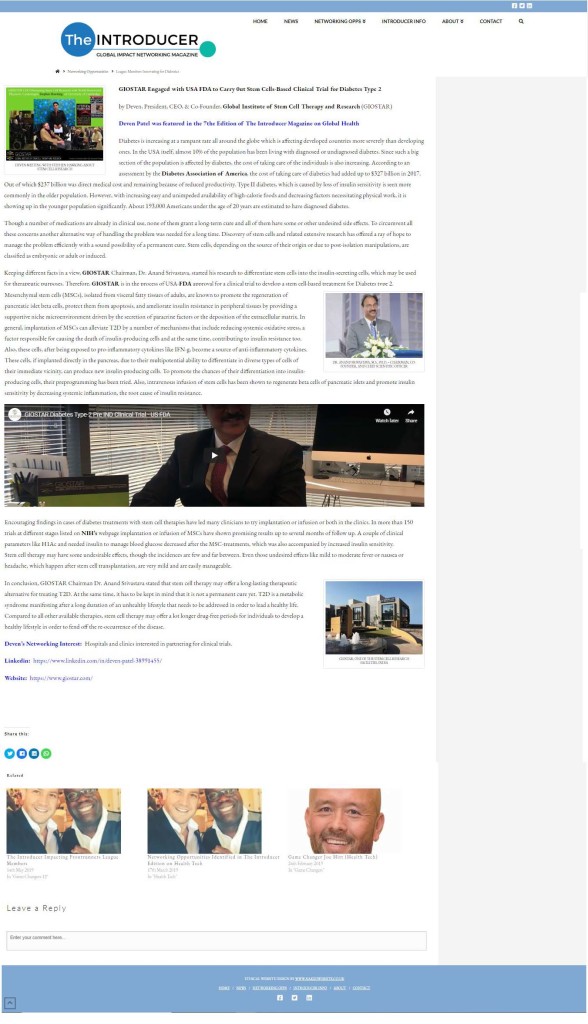GIOSTAR Engaged with USA FDA to Carry 0ut Stem Cells-Based Clinical Trial for Diabetes Type 2

Diabetes is increasing at a rampant rate all around the globe which is affecting developed countries more severely than developing ones. In the USA itself, almost 10% of the population has been living with diagnosed or undiagnosed diabetes. Since such a big section of the population is affected by diabetes, the cost of taking care of the individuals is also increasing. According to an assessment by the Diabetes Association of America, the cost of taking care of diabetics had added up to $327 billion in 2017. Out of which $237 billion was direct medical cost and remaining because of reduced productivity. Type II diabetes, which is caused by loss of insulin sensitivity is seen more commonly in the older population. However, with increasing easy and unimpeded availability of high-calorie foods and decreasing factors necessitating physical work, it is showing up in the younger population significantly. About 193,000 Americans under the age of 20 years are estimated to have diagnosed diabetes.
Though a number of medications are already in clinical use, none of them grant a long-term cure and all of them have some or other undesired side effects. To circumvent all these concerns another alternative way of handling the problem was needed for a long time. Discovery of stem cells and related extensive research has offered a ray of hope to manage the problem efficiently with a sound possibility of a permanent cure. Stem cells, depending on the source of their origin or due to post-isolation manipulations, are classified as embryonic or adult or induced.
Keeping different facts in a view, GIOSTAR Chairman, Dr. Anand Srivastava, started his research to differentiate stem cells into the insulin-secreting cells, which may be used for therapeutic purposes. Therefore, GIOSTAR is in the process of USA-FDA approval for a clinical trial to develop a stem cell-based treatment for Diabetes type 2. DR. ANAND SRIVASTAVA, M.S., PH.D. – CHAIRMAN, CO-FOUNDER, AND CHIEF SCIENTIFIC OFFICER
Mesenchymal stem cells (MSCs), isolated from visceral fatty tissues of adults, are known to promote the regeneration of pancreatic islet beta cells, protect them from apoptosis, and ameliorate insulin resistance in peripheral tissues by providing a supportive niche microenvironment driven by the secretion of paracrine factors or the deposition of the extracellular matrix. In general, implantation of MSCs can alleviate T2D by a number of mechanisms that include reducing systemic oxidative stress, a factor responsible for causing the death of insulin-producing cells and at the same time, contributing to insulin resistance too. Also, these cells, after being exposed to pro-inflammatory cytokines like IFN-g, become a source of anti-inflammatory cytokines. These cells, if implanted directly in the pancreas, due to their multipotential ability to differentiate in diverse types of cells of their immediate vicinity, can produce new insulin-producing cells. To promote the chances of their differentiation into insulin-producing cells, their preprogramming has been tried. Also, intravenous infusion of stem cells has been shown to regenerate beta cells of pancreatic islets and promote insulin sensitivity by decreasing systemic inflammation, the root cause of insulin resistance.
Encouraging findings in cases of diabetes treatments with stem cell therapies have led many clinicians to try implantation or infusion or both in the clinics. In more than 150 trials at different stages listed on NIH’s webpage implantation or infusion of MSCs have shown promising results up to several months of follow up. A couple of clinical parameters like H1Ac and needed insulin to manage blood glucose decreased after the MSC-treatments, which was also accompanied by increased insulin sensitivity.
Stem cell therapy may have some undesirable effects, though the incidences are few and far between. Even those undesired effects like mild to moderate fever or nausea or headache, which happen after stem cell transplantation, are very mild and are easily manageable.

GIOSTAR, ONE OF THE STEM CELL RESEARCH FACILITIES, INDIA
In conclusion, GIOSTAR Chairman Dr. Anand Srivastava stated that stem cell therapy may offer a long-lasting therapeutic alternative for treating T2D. At the same time, it has to be kept in mind that it is not a permanent cure yet. T2D is a metabolic syndrome manifesting after a long duration of an unhealthy lifestyle that needs to be addressed in order to lead a healthy life. Compared to all other available therapies, stem cell therapy may offer a lot longer drug-free periods for individuals to develop a healthy lifestyle in order to fend off the re-occurrence of the disease.
Deven’s Networking Interest: Hospitals and clinics interested in partnering for clinical trials.
Linkedin: https://www.linkedin.com/in/deven-patel-38991455/
Website: http://giostar.com/
Source : https://www.theintroducermagazine.com/league-members-innovating-for-diabetics/


